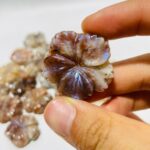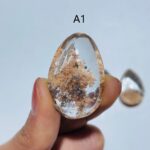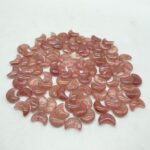Introduction
Crystals have captivated humans for centuries, holding a mystique that transcends their physical form. From ancient civilizations to modern-day enthusiasts, these shimmering stones have been revered for their beauty, healing properties, and potential to unlock hidden powers. But beyond their aesthetic appeal, crystals also hold significant economic value. Whether mined for industrial purposes or sought after as precious gems, the worth of crystals extends far beyond their scientific properties.

Market Value of Crystals
The global crystal market is a multi-billion dollar industry, with demand driven by a wide range of applications. In 2021, the market was valued at approximately $19.4 billion, and is projected to grow at a CAGR of 6.2% over the next five years. The United States remains the largest consumer of crystals, followed by China and India.
Industrial Crystals
Industrial crystals play a vital role in various sectors, including electronics, construction, and manufacturing. Quartz, for example, is widely used as a piezoelectric material in oscillators and sensors, while calcite is essential for cement production. Other industrial crystals include feldspar, gypsum, and fluorspar.
Gemstones
Crystals with exceptional clarity, color, and cut are highly sought after as gemstones. Diamonds, rubies, and emeralds are among the most valuable gemstones, commanding premium prices in the jewelry market. Secondary gemstones include topaz, amethyst, and aquamarine.
Factors Influencing Crystal Worth
The value of a crystal is determined by a complex interplay of factors, including:
Scarcity
The rarity of a crystal significantly influences its worth. Diamonds, for instance, are more valuable than quartz because they are found in far fewer locations worldwide.
Size and Clarity
Larger, blemish-free crystals are généralement more valuable than smaller or less flawless counterparts.
Cut and Color
The cut and color of a gemstone can dramatically affect its value. Well-cut, vibrant-colored gems generally fetch higher prices.
Treatments and Enhancements
Some crystals undergo treatments, such as heat treatment or irradiation, to enhance their appearance. While these enhancements can increase a crystal’s value, they must be disclosed to ensure fair market valuation.
Applications of Crystals
The versatility of crystals extends beyond their aesthetic and economic value. They possess a wide range of scientific, technological, and therapeutic applications.
Industrial
- Piezoelectrics: Crystals used in oscillators, sensors, and actuators
- Optical materials: Crystals used in lasers, lenses, and windows
- Thermal insulators: Crystals used in furnaces and heat sinks
Technological
- Semiconductors: Crystals used in transistors, diodes, and other electronic devices
- Superconductors: Crystals used in high-power magnets and energy storage systems
- Energy harvesting: Crystals used in solar cells and piezoelectric generators
Therapeutic
- Lithotherapy: The use of crystals for healing and well-being
- Crystal energy: Crystals believed to possess energy that can influence physical, emotional, and spiritual health
- Crystal grids: Arrangements of crystals used to amplify energy and manifest intentions
Emerging Applications: Crystal Tech
The term “crystal tech” encompasses innovative applications of crystals that harness their unique properties to solve real-world problems. These applications include:
- Flexible electronics: Crystals used in bendable and stretchable electronic devices
- Bioelectronics: Crystals used to interface with biological systems for medical and health monitoring
- Quantum computing: Crystals used to develop quantum computers with unprecedented processing power
Table 1: Industrial Crystal Applications
| Crystal | Application |
|---|---|
| Quartz | Oscillators, sensors, piezoelectric devices |
| Calcite | Cement, construction materials |
| Feldspar | Ceramics, glass |
| Gypsum | Wallboard, plaster |
| Fluorspar | Aluminum production, steelmaking |
Table 2: Gemstone Value Factors
| Factor | Description |
|---|---|
| Scarcity | Number of known occurrences |
| Size | Weight in carats |
| Clarity | Number and size of blemishes |
| Cut | Symmetry, proportions, and polish |
| Color | Hue, saturation, and tone |
Table 3: Crystal Tech Applications
| Application | Crystal |
|---|---|
| Flexible electronics | Graphene, molybdenum disulfide |
| Bioelectronics | ZnO, GaN |
| Quantum computing | Diamond, silicon carbide |
Table 4: Therapeutic Uses of Crystals
| Crystal | Benefits |
|---|---|
| Amethyst | Calming, stress relief |
| Citrine | Wealth, abundance |
| Rose quartz | Love, relationships |
| Clear quartz | Amplification, purification |
| Black tourmaline | Protection, grounding |
Conclusion
Crystals are more than mere objects of beauty; they hold immense economic value and possess a wide range of scientific, technological, and therapeutic applications. Their versatility drives demand across industries, from electronics to construction to jewelry. As research into crystal technology continues, we can anticipate even more groundbreaking applications in the years to come. By understanding the factors that determine crystal worth and exploring the latest advancements in crystal tech, individuals and businesses can harness the power of these remarkable materials in their pursuit of innovation and well-being.




























